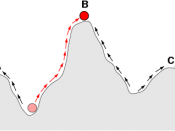- -
'If intelligence sets us apart among organisms, then I think is probable that natural selection acted to
maximize the flexibility of our behavior. What would be more adaptive for a learning and thinking animal: genes
selected for aggression, spite an d xenophobia; or selection for learning rules that can generate aggression in
appropriate circumstances and peacefulness in others.' - Stephen Jay Gould, 1981
True enough, the plasticity of human behavior is a very important hallmark
of the species; one which has facilitated its spread into almost every
ecosystem on the planet. Yet, as correct as Gould's reasoning is; he is
overlooking some important perspecti ves.
For one; assuming that humans evolved from organisms which had
substantially less ability to learn ontogenicaly; it is hard to deny that there
must be, at least some residual effects of prior evolution present in modern
human behavior. It seems highly un likely that the behavior of humanity,
however malleable, has completely escaped the slow progressive influence of
genetic selection.
If human behavior is learned, and is fully controlled by the 'freewill' of the
individual, then why is it so well geared to adaptive, gene promoting action?
Is it by random chance that humans the world over choose to feel painfully
jealous if their mate leaves them for another or anguished at the loss of a
child? Did every culture in the world independently just happen to feel
aversion to incest and create taboos against it?
Humans don't learn to get hungry when their bodies need sustenance; they
get an urge that influences their behavior in an unarguably adaptive manner.
People are averted by spoiled food because it smells bad. Rotten food smells
bad because it sickened an d killed all those who did not mind its odor. There
is nothing in the...



Uhhh....this essay is an ok.
This is a little better than what I saw today.
0 out of 0 people found this comment useful.